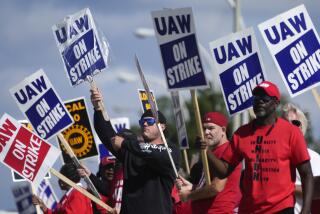NEWS ANALYSIS : UAL’s New Owners Face a Tricky Task: Picking Their Boss
Raising financing for the buyout of their company won’t be the biggest challenge facing United Airlines’ employees. The big problem will be choosing somebody to run the airline and then cooperating with their appointed boss--and among themselves.
Despite the pay, it may not be easy to find a boss who will take the top job at UAL. (Stephen M. Wolf, the current chairman, who will be out if the employees complete their buyout, made $575,000 a year in salary but added on $5.8 million in stock option gains last year.) However, stock gains won’t be immediately available to a new chief executive; it could be five or six years before United sells stock to the public again, enabling employees to realize the financial rewards of their new equity ownership.
Managerial independence will be a ticklish problem. If UAL’s union owners appoint a milquetoast who is too ready to do their bidding, United Airlines won’t get the discipline it needs in a very competitive service business.
On the other hand, a tough guy, such as former Northwest Airlines Chairman Steven G. Rothmeier, won’t do either. A boss who can’t get cooperation and respect from employees would merely carry on the recent, ruinous tradition at United Airlines, which has run through three chairmen in the last three years, while losing its No. 1 position in the U.S. airline business.
Running an airline demands a delicate balance of silk and steel. It’s a difficult service business in which employees meet the public at many levels--and not just any public, but harried travelers who may be secretly afraid of flying and are frequently irascible, shouting and cursing. To that public, the airline employee must respond with a sweet, “Yes, and how can I help you?” It takes self-discipline--and the dedication that characterizes a well-managed company.
But there’s no cookie-cutter model for success. The two most successful U.S. airlines today, American and Delta, represent dramatically different approaches.
American Airlines, the U.S. leader, is run by a tough, intensely competitive boss, Chairman Robert L. Crandall, whom the employees respect because he keeps his word and because his competitive success creates opportunities. Promotions are rapid in a growing company; it’s possible for a new pilot to make captain, earning $150,000 a year easily, in eight years at American today. And Crandall is pushing for new growth internationally, having recently bought Eastern Airlines’ South American routes and Trans World Airlines’ Chicago-London route. Airline analysts report that European airlines are scared stiff of Crandall.
On the other hand, Delta Air Lines is successful with a completely different style. A non-union company, Delta retains an old-fashioned family company approach despite 50,000 employees and $8 billion in revenue.
They tell stories about its employee relations--of a Delta chairman in the 1970s asking shareholders to accept a lower dividend so layoffs could be avoided in hard times; of pilots loading baggage during the recession of the early 1980s to keep working and improve service for the fewer passengers who were flying. (Delta scores highest in the passenger acceptance rankings of Airline Economics, an industry research firm.)
United’s approach for the moment will have to be that of American--find a tough, competent boss--because it takes a long time to build a culture like Delta’s.
But the company had better hustle to make up for the time and opportunities it has lost in years of arguing over control.
On the other hand, if the employees succeed in buying the company and get their act together, they have a tremendous opportunity. To be sure, employees may be worried today, knowing only that the buyout means that they will have to sacrifice for the next few years--take wage cuts and accept changes in working conditions--so the debt can be repaid. But five or six years from now, they could be looking at the rewards of owning equity, when their stake in the airline company may have trebled in value.
Why such optimism? Because global travel is likely to be one of the premier growth industries of the 1990s, and United--with attractive Pacific routes and a marketing hookup in Europe with British Airways--is positioned to prosper. The employees are buying well; they can become rich if they manage well too.
More to Read
Inside the business of entertainment
The Wide Shot brings you news, analysis and insights on everything from streaming wars to production — and what it all means for the future.
You may occasionally receive promotional content from the Los Angeles Times.










